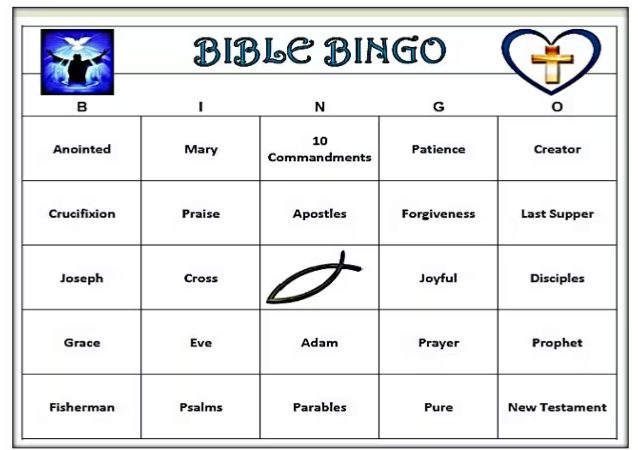Christians can play bingo if it aligns with their personal convictions and community standards.
Understanding Bingo Within Religious Contexts
When diving into the multifaceted relationship between bingo and its place within various religious contexts, it’s essential to dissect the layers that form the opinions, teachings, and practices surrounding this popular game. The game of bingo, often associated with fundraising and social events, has had a complex history with religious institutions, sparking debates and diverse perspectives based on cultural, ethical, and doctrinal viewpoints.

The History of Bingo and the Church
Bingo, a game of chance where numbers are called out and players mark corresponding numbers on their cards, has surprising historical roots intertwined with the church. Originally, bingo sessions became prominent as a method of raising necessary funds for churches. For instance, in the 1930s, a priest from Pennsylvania approached Edwin Lowe, the man who popularized bingo in the United States, to use the game as a means of combating the financial struggles of the church. This practice quickly gained momentum, with approximately 10,000 bingo games held weekly by 1934, often in churches.
Over the years, these church-hosted bingo nights became an accepted and widespread method of fundraising within many Christian communities. However, this was not without controversy, as debates about morality, the risks of gambling, and the integrity of using such methods for religious or charitable purposes emerged.
Link to Wikipedia’s Bingo history
Different Religious Perspectives on Gambling
Within the vast array of Christian denominations, perspectives on gambling and, by extension, bingo, vary significantly. Catholicism, for instance, does not outright condemn gambling, provided it is fair, all betters have a reasonable chance of winning, and the actions do not deprive one of the means to provide for oneself or others.
In contrast, certain Protestant denominations have been more stringent. For instance, Southern Baptists have historically opposed all forms of gambling, citing its potential to lead to addiction, loss of economic integrity, and breakdowns in family structures due to financial ruin.
The varying stances underline the importance of understanding individual denominational beliefs, as these significantly influence the congregation’s engagement and acceptance of activities like bingo.
Link to Wikipedia’s religious perspectives on gambling
The Role of Cultural Context in Defining Gambling
Cultural implications often play a critical role in shaping the religious viewpoint of gambling activities. The perception of bingo and other forms of betting differs vastly across countries and communities.
The societal norms and cultural leanings of a community can often dictate the acceptance levels of gambling, including games like bingo, thus molding the religious response to these practices.
In this exploration, the intricacies of cultural, ethical, and religious factors all interplay to shape the landscape, understanding, and acceptance of bingo within religious contexts.
Theological Reflections on Bingo
In discussing the nuances of bingo within the sphere of religious acceptability, theological reflections offer deep insights into the moral, ethical, and spiritual undertones that govern Christian perspectives on activities like gambling. This examination is crucial, given that it helps individuals navigate the moral implications of engaging in or abstaining from games of chance like bingo.
Biblical Guidance Related to Gambling
The Bible, while not mentioning gambling explicitly, does provide guidance through principles that warn against the potential dangers associated with such activities. Scriptures such as Proverbs 13:11, “Wealth gained hastily will dwindle, but whoever gathers little by little will increase it,” caution against the pursuit of easy money, which is often a common temptation in gambling.
Another pivotal scriptural reference is the parable of the talents (Matthew 25:14-30), where the servants are entrusted with money and expected to use it wisely rather than squander it or engage in reckless ventures. These and other teachings emphasize a life of hard work, ethical living, and avoidance of attempts to gain wealth through luck or at the expense of others.
Link to Bible’s stance on gambling
The Concept of Stewardship in Christianity
Stewardship, a deeply fundamental concept in Christianity, pertains to the responsible management of valuable resources, often believed to be God-given.
This concept extends to the use of money and resources. Engaging in activities like bingo in a manner that supports the community, such as fundraising for charitable causes, can be viewed positively. However, it is crucial that these engagements do not encourage excessive spending or prioritization of gambling over essential financial responsibilities. The stewardship principle encourages moderation, responsibility, and the continual reflection of one’s actions on their community and their spiritual life.
Ethical Considerations of Gambling Activities
From an ethical standpoint, gambling can be a complex issue. While bingo for fundraising or as a social activity can be harmless and enjoyable, it may also lead to challenges such as addiction, financial hardship, and social consequences, particularly in cases of excessive indulgence.
Christian ethics also raise concerns about exploiting others in games of chance. For instance, is it morally acceptable to benefit from games where others may suffer loss, financial or otherwise? What distinguishes a friendly game of bingo from the potential ills seen in more high-stakes gambling? These questions reflect the ethical dilemmas Christians face, emphasizing the need for community dialogue and self-reflection.
The assessment of bingo’s acceptability, therefore, is not a straightforward verdict but rather a personal and communal journey through the teachings of scripture, ethical considerations, and the cultural implications of the game within the church community. This reflection requires careful consideration, compassion, and sensitivity towards those who view this issue from various perspectives.

Bingo for Charity: Ethical Implications and Church Involvement
Bingo nights have a storied tradition in many community centers and churches, raising funds for various worthy causes. However, the intertwining of a form of gambling with charitable efforts brings up significant ethical questions within Christian communities. This duality demands a close examination of the motives, impacts, and theological underpinnings of such activities.
The Tradition of Church-Hosted Bingo Nights
Church-hosted bingo nights have a longstanding history, particularly in Western countries, as a popular means of bringing communities together and raising funds for church activities, outreach programs, and charities. These events are often characterized by a family-friendly atmosphere, and the stakes are usually kept modest to ensure the nature of the gambling involved remains light-hearted and accessible.
While the primary aim is often fundraising, these events are also vital for community building. They provide a space for social interaction, unity, and collective enjoyment within a morally acceptable framework sanctioned by the church’s authority. This tradition aligns with the church’s role as a community center and reflects the broader cultural acceptance of bingo compared to other forms of gambling.
Link to the tradition of bingo
Charitable Fundraising vs. Promotion of Gambling
The ethical dilemma often begins when considering the thin line between raising money for a good cause and promoting gambling. From one perspective, the funds raised can significantly aid charitable projects, with some churches raising thousands of dollars on a single bingo night for missions, building repairs, or outreach programs. This aspect of bingo can be incredibly positive, highlighting the concept of using potential profits for the greater good.
However, opponents argue that promoting any form of gambling could potentially encourage participants to engage further in gambling beyond these events. They raise concerns about issues like addiction, financial strain on families, and the moral implications of relying on a form of entertainment that could potentially jeopardize someone’s financial security.
Case Studies: Success Stories of Bingo in Churches
Several churches have managed to navigate these ethical pitfalls successfully, creating models that other religious institutions might emulate. For example, St. Mary’s Church in Springfield, Illinois, turned bingo nights into a town tradition, raising funds while also instituting strict rules against excessive spending, and using proceeds to support community projects, such as homeless shelters and food banks.
Another case is the Community Church in San Diego, California, which adopted bingo for charity to fund its youth programs. By limiting the frequency of these events and emphasizing community spirit over winning, the church promotes responsibility and ensures that these games adhere to their charitable mission.
These success stories highlight the possibility of a middle ground, wherein churches can engage in bingo for fundraising without compromising their congregants’ ethical or spiritual well-being.
Addressing Potential Risks and Concerns
While bingo events in a church setting aim for community building and fundraising, it’s irresponsible to overlook the potential risks involved. These concerns, particularly around gambling addiction and financial irresponsibility, require proactive strategies to ensure a healthy balance between enjoyment, community responsibility, and individual well-being.
Recognizing Signs of Gambling Addiction
One primary concern is the risk of gambling addiction. It’s vital for organizers and community leaders to understand and recognize the signs of this issue. Symptoms can include a preoccupation with gambling, needing to gamble with increasing amounts of money, and trying to make up losses by further gambling.
This approach may involve referring individuals to professional counseling or support groups that specialize in handling gambling addiction.
Link to gambling addiction support
Balancing Community, Enjoyment, and Responsibility
The heart of church-hosted bingo nights is the strengthening of community bonds. However, ensuring these events do not compromise attendee responsibility is a delicate balance. This balance involves creating an environment where participation in games is a choice, not an obligation, and where the spirit of competition does not overshadow the sense of community, enjoyment, and mutual support.
To maintain this equilibrium, churches might consider strategies like setting a cap on the amount of money individuals can spend on bingo cards, thus preventing overspending. Furthermore, conveying the message that the primary purpose of the event is to foster community relations and support charitable causes, rather than personal financial gain, can help preserve a wholesome atmosphere.
Safeguards and Policies for Responsible Bingo Events
Implementing safeguards and establishing clear policies are necessary steps in promoting responsible gaming. These measures could include:
- Setting limits: Such as restricting the sale of bingo cards to a certain number per person or setting a maximum spending limit to prevent excessive gambling.
- Clear communication: Ensuring all participants are aware of the rules, limits, and purpose of the event can prevent misunderstandings and keep the focus on community and charity.
- Transparency in fundraising: Openly reporting on the allocation of funds raised reassures participants of the ethical handling of proceeds and reinforces trust in the church’s stewardship.
- Support availability: Providing resources for gambling addiction support, and having a trained professional available for consultation during events, shows a proactive stance in prioritizing participants’ well-being.
By instituting these practices, churches underscore their commitment to the congregation’s welfare, ethical fundraising, and the moral standards expected within Christian communities. This responsible approach enhances the positive impacts of bingo nights, mitigating potential risks and emphasizing the communal and charitable spirit of such events.
Community and Clergy: Navigating the Bingo Controversy
The issue of bingo in church settings often sparks heated debates within Christian communities, creating a divide between proponents of church-sponsored bingo events and those who view them as a form of unethical gambling. This controversy calls for a thoughtful dialogue, grounded in theological teachings, ethical considerations, and the socio-cultural impact of such activities on the community.
Debates within the Christian Community
The Christian community worldwide holds diverse views on bingo, primarily because of its gambling elements. On one side, some individuals argue that bingo nights are harmless recreational activities, especially when proceeds go to charity.
On the other hand, opponents express concerns regarding the potential for addiction, the propriety of churches encouraging gambling, and whether these activities align with Biblical teachings. These debates often hinge on different interpretations of scripture and vary significantly across denominations and individual beliefs.
The challenge lies in reconciling these differing viewpoints, a process that requires deep empathy, open-minded discussion, and respect for diverse opinions within the Christian community.
Link to a discussion on Christian views on gambling
Perspectives from Christian Leaders and Theologians
Christian leaders and theologians play a crucial role in shaping the dialogue around church-sponsored bingo. Many renowned theologians advocate for a measured approach. For example, they may argue that while scripture does not explicitly mention bingo or gambling, the principles of stewardship and love for one’s neighbor should guide Christians’ decisions in these matters.
Clergy perspectives also emphasize the church’s responsibility to protect vulnerable individuals and uphold moral standards. They remind that if church activities, like bingo, cause brethren to stumble in their faith, the spiritual cost is too high, referencing scriptural directives to avoid causing others to fall into sin.
By engaging with theological discourse and church teachings, clergy and theologians provide a structured framework for these complex discussions, guiding the layperson in understanding this issue from a faith-based perspective.
Building Consensus: Strategies for Healthy Dialogue
Achieving consensus on bingo within Christian communities requires strategic dialogue that embraces diverse viewpoints while grounding the discussion in Christian doctrine and ethical considerations. Strategies for fostering such dialogue include:
- Educational forums: Hosting workshops or discussions guided by knowledgeable individuals about gambling’s ethical, social, and economic aspects. These sessions can inform community members, thus shaping a more nuanced communal perspective.
- Panel discussions with diverse voices: Organizing events with a balanced representation of views, including theologians, community leaders, and congregation members, to ensure all opinions are heard and considered.
- Congregational input and feedback: Encouraging congregation members to voice their thoughts and concerns, perhaps through surveys or town hall meetings, ensures transparency and communal participation in decision-making.
- Guidance and mediation from unbiased facilitators: Utilizing experienced mediators to navigate emotionally charged discussions can help maintain respect and understanding among all participants.
By employing these strategies, churches can foster a healthy environment for debate, drawing on Christian teachings and community values to navigate the bingo controversy thoughtfully and respectfully. This inclusive approach ensures that any consensus reached reflects the congregation’s collective wisdom and the church’s ethical and spiritual commitments.

